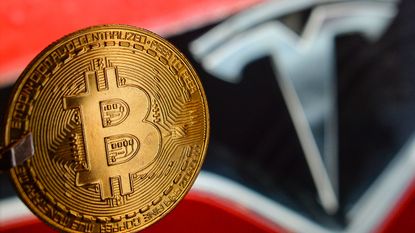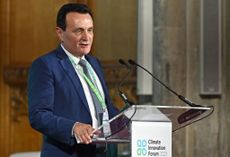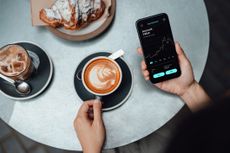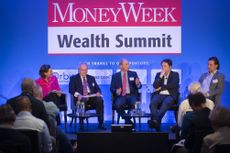Tesla just bought a load of bitcoin – get ready for executive FOMO
Electric-car maker Tesla just bought $1.5bn worth of bitcoin, sending the cryptocurrency to new highs. And as it goes mainstream, more and more corporations will have to buy in, says Dominic Frisby.


Another day, another record high. There’s only really one story to cover today, and that’s bitcoin. Again. As I write it stands at $47,000. Yesterday saw its greatest up day ever. Why? Elon Musk –that’s why.
Yesterday, Nasdaq-listed car manufacturer, Tesla (TSLA) announced that it has bought some $1.5bn-worth of bitcoin. The price (of bitcoin, not Tesla) duly shot up. It’s hardly a surprise. Last month, Tesla announced that it might hold some of its cash reserves in “certain alternative reserve assets including digital assets, gold bullion [and] gold exchange-traded funds.”
Then the world’s richest man added the bitcoin hashtag to his bio on Twitter. He began making cryptic comments. “In retrospect it was inevitable”, he said. He started posting memes about dogecoin, a cryptocurrency that was invented as a joke (yes, really), going to the moon. Then last week Musk said, during a conversation on Clubhouse, that he thought bitcoin “was on the verge of broad acceptance”.
Subscribe to MoneyWeek
Subscribe to MoneyWeek today and get your first six magazine issues absolutely FREE

Sign up to Money Morning
Don't miss the latest investment and personal finances news, market analysis, plus money-saving tips with our free twice-daily newsletter
Don't miss the latest investment and personal finances news, market analysis, plus money-saving tips with our free twice-daily newsletter
Then yesterday Tesla announced the following to the US financial regulator, the SEC: “We invested an aggregate $1.5bn in bitcoin... and may acquire and hold digital assets from time to time or long-term”.
Bitcoin was trading in the $30,000-35,000 zone in the fortnight over which Tesla was accumulating. Overnight it hit $47,000, so Tesla is already up some 30%–50% – over $500m – on its investment. Nice work if you can get it.
What happens when the world’s top executives get FOMO?
So what happens next? FOMO (fear of missing out) is what, but this time at the corporate level. Bitcoin’s extraordinary price surges have this tendency to create the most extraordinary FOMO.
It was Michael Saylor, CEO of Nasdaq-listed Microstrategy, who piqued Musk’s interest in bitcoin when he told him on Twitter: “If you want to do your shareholders a $100bn favour, convert the Tesla balance sheet from dollars into bitcoin. Other firms on the S&P 500 would follow your lead and in time it would grow to become a $1trn favour.”
Saylor was the CEO who kickstarted the corporate rush into bitcoin back in 2020. On seeing the volumes of Federal Reserve money-printing in reaction to Covid, Saylor converted the company’s $500m balance sheet into bitcoin. In December he raised another $625m and put that into bitcoin as well.
Having spent 15 years trading in the $100-150 range, the Microstrategy share price launched upwards and now sits over $1,000. In the meantime, Saylor has become the most extraordinary spokesperson for the space, building up a huge following, and has taken it upon himself to educate other CEOs as to how they can convert their treasuries into bitcoin.
CEOs who previously shunned bitcoin are going to be looking at the likes of Saylor and Musk (not to mention Twitter’s Jack Dorsey, who has already taken the plunge into bitcoin via his company Square) and realising they have to get in on the game, not just because of the erosion in the purchasing power of their own treasuries.
Their shareholders will demand it. “Why are you not holding a portion of your treasury in bitcoin?” they will be repeatedly asked during earnings calls. Those who stubbornly refuse will be made to look like fools by the rising price and risk losing their jobs.
Rumour is Apple will be next, not just for its corporate treasury, but to use with Apple Wallet. Can you see Amazon letting this one pass by?
Bitcoin will soar, then crash – that’s what it does. But it’s still going mainstream
And so we slide into hyperbitcoin-isation – the rapid rush to adopt bitcoin. It happens time and time again, only this time it’s at the corporate level. There are around 3,500 publicly traded companies in the US alone, with more than $5trn in their treasuries. They are all suffering the bleed of zero interest rates, money printing and runaway asset price inflation, plus now, an enormous sense of FOMO, with a dash of peer pressure thrown in.
Bitcoin’s finite supply – there will only ever be 21 million, about 20% of which is lost and another 40% tightly held in cold storage (the equivalent of being locked up in a safe, but digital) and unlikely to come to market any time soon – means there is a huge upward pressure on prices.
This is all very bubbly. Bitcoin has repeatedly been accused of being a bubble, ditto Tesla. The two have combined. It all depends on your definition of a bubble, of course. Mine is: a bubble is a bull market in which you don’t have a position.
There are always new bubbles around new technology. Bitcoin is a new tech that is money. It’s as bubbly as it gets. We have massive “greater fool theory” in play here. Bitcoin will go up many times, and then it will crash. This is what it does. But currently every single person who ever bought bitcoin (and didn’t sell) is in profit.
In its SEC filing, Tesla added the following, extremely significant comment : “We expect to begin accepting bitcoin as a form of payment for our products in the near future”. You will soon be able to buy Teslas with bitcoin. Every other car company will have to do the same, if they want to keep up with the Jones.
Visa announced a Visa crypto software programme last week with which it will help banks roll out bitcoin and cryptocurrency buying and trading services. Paypal (whose boss Peter Thiel is a bitcoin fan) has made it possible for users in certain jurisdictions to buy bitcoin – and PayPal’s share price is up 40%.
These developments all form part of the bigger story, which is the gradual mass adoption of bitcoin. Individuals, then corporations – next will be nation states. Absurd, you may say, but we are already seeing signs.
The City of Miami has been buying (the mayor wants to turn Miami into a bitcoin capital). Other jurisdictions in Florida are moving to hold bitcoin and accept it as a means of payment. Ohio already accepts it as a means to pay taxes.
Nations that have suffered with weak currencies, but where energy is cheap, are already making moves. Both the Iranian and Venezuelan governments are mining bitcoin. Ukraine's Ministry of Energy wants to do the same to make use of the country's excess nuclear power.
What was once some crackpot darknet money favoured by nerds, misfits and drug dealers is entering the mainstream. He who acts first, acts best – as the saying sort of goes.
I wrote about bitcoin (and mentioned Musk’s likely interest in it) in MoneyWeek two weeks ago. If you’re not already a subscriber, you can get your first six issues free here.
Dominic Frisby’s book Bitcoin: the Future of Money? (2014), available at Amazon and all good bookshops with the audiobook, read by the author, on Audible. His latest effort is Daylight Robbery: How Tax Shaped Our Past And Will Change Our Future.
Dominic Frisby (“mercurially witty” – the Spectator) is the world’s only financial writer and comedian. He is MoneyWeek’s main commentator on gold, commodities, currencies and cryptocurrencies. He is the author of the books Bitcoin: the Future of Money? and Life After The State. He also co-wrote the documentary Four Horsemen, and presents the chat show, Stuff That Interests Me.
His show 2016 Let’s Talk About Tax was a huge hit at the Edinburgh Festival and Penguin Random House have since commissioned him to write a book on the subject – Daylight Robbery – the past, present and future of tax will be published later this year. His 2018 Edinburgh Festival show, Dominic Frisby's Financial Gameshow, won rave reviews. Dominic was educated at St Paul's School, Manchester University and the Webber-Douglas Academy Of Dramatic Art.
You can follow him on Twitter @dominicfrisby
-
 Revealed: Best buy-to-let property hotspots in the UK
Revealed: Best buy-to-let property hotspots in the UKLooking for the best buy-to-let property locations in the UK? We reveal the top 10 postcodes with the strongest rental returns
By Oojal Dhanjal Published
-
 AstraZeneca CEO’s £1.8mn pay rise approved despite shareholder opposition
AstraZeneca CEO’s £1.8mn pay rise approved despite shareholder oppositionAstraZeneca hiked its dividend to persuade shareholders to accept CEO Pascal Soriot’s pay rise. Is he worth his salary?
By Dr Matthew Partridge Published
-
 Halifax: House price slump continues as prices slide for the sixth consecutive month
Halifax: House price slump continues as prices slide for the sixth consecutive monthUK house prices fell again in September as buyers returned, but the slowdown was not as fast as anticipated, latest Halifax data shows. Where are house prices falling the most?
By Kalpana Fitzpatrick Published
-
 Rents hit a record high - but is the opportunity for buy-to-let investors still strong?
Rents hit a record high - but is the opportunity for buy-to-let investors still strong?UK rent prices have hit a record high with the average hitting over £1,200 a month says Rightmove. Are there still opportunities in buy-to-let?
By Marc Shoffman Published
-
 Pension savers turn to gold investments
Pension savers turn to gold investmentsInvestors are racing to buy gold to protect their pensions from a stock market correction and high inflation, experts say
By Ruth Emery Published
-
 Where to find the best returns from student accommodation
Where to find the best returns from student accommodationStudent accommodation can be a lucrative investment if you know where to look.
By Marc Shoffman Published
-
 Best investing apps
Best investing appsWe round up the best investing apps. Looking for an easy-to-use app to help you start investing, keep track of your portfolio or make trades on the go?
By Ruth Emery Last updated
-
 The world’s best bargain stocks
The world’s best bargain stocksSearching for bargain stocks with Alec Cutler of the Orbis Global Balanced Fund, who tells Andrew Van Sickle which sectors are being overlooked.
By Andrew Van Sickle Published
-
 Revealed: the cheapest cities to own a home in Britain
Revealed: the cheapest cities to own a home in BritainNew research reveals the cheapest cities to own a home, taking account of mortgage payments, utility bills and council tax
By Ruth Emery Published
-
 UK recession: How to protect your portfolio
UK recession: How to protect your portfolioAs the UK recession is confirmed, we look at ways to protect your wealth.
By Henry Sandercock Last updated